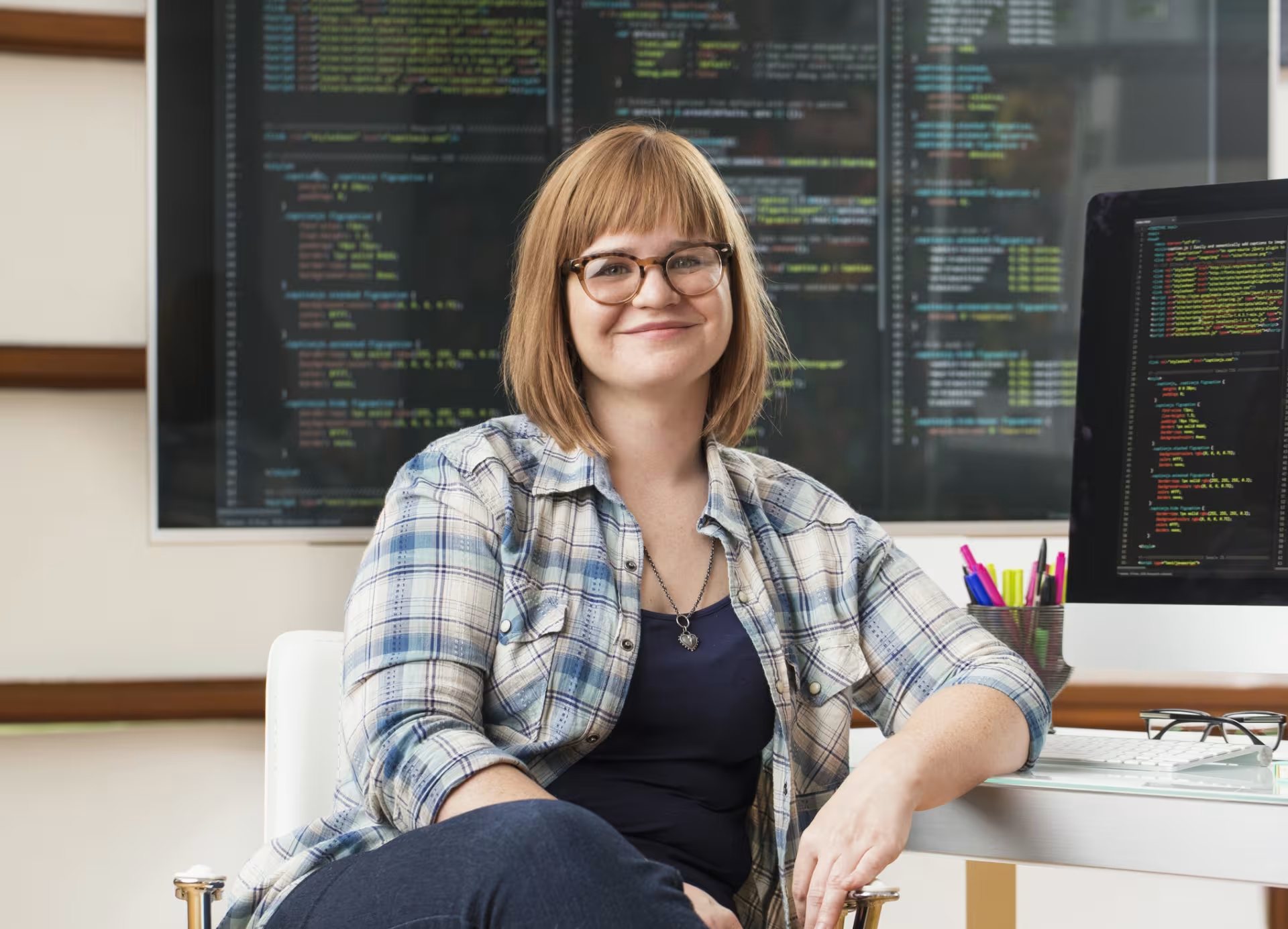
How To Become a Software Engineer
What Is a Software Engineer?
A software engineer is an expert in the design, development and testing of software applications and programs. Software engineers combine an engineering and computer science mindset to create solutions to technical problems. If you’ve ever used a GPS application on your phone, browsed through a menu of TV shows from a streaming service on your smart TV or used a fitness tracker to count how many calories you’ve burned, then you’ve benefited from the hard work of software engineers.
Before considering how to become a software engineer, it’s helpful to learn what this career entails. The term “software engineering” is often used interchangeably with “software development,” but they aren’t quite the same thing. Software engineers work on the entire lifecycle of a project, supervising everything from infrastructure to security. Software development — a subset of software engineering — is focused more narrowly on coding tasks.(See disclaimer 1)
Estimated market volume for the global software market by 2029(See disclaimer 2)
What Does a Software Engineer Do?
Software engineers can work on a wide range of projects and within a variety of areas, including video games, cybersecurity, cloud storage, apps and web apps.(See disclaimer 3)
To become a software engineer, it’s helpful to know how to look at the big picture. Software engineers are charged with managing and working on all different aspects of the project — from initial design to quality testing and maintenance.(See disclaimer 1)
While the responsibilities of a software engineer can look a little different for each professional, they may be tasked to do any of the following:(See disclaimer 1,3)
Project Requirements
Software engineers review customer requirements for a project before launching into the design phase.
Software Development
These engineers design and develop software programs, including writing and testing code.
Security and Quality
They ensure the project not only meets customer requirements, but also meets standards of security and quality.
Testing
After the initial development, the software must be thoroughly tested and tweaked to eliminate bugs.
Consultation
Software engineers may consult clients, security specialists and other stakeholders to ensure the software program meets expectations.
Maintenance
They maintain software, optimizing it as needed, developing new features, debugging issues and ensuring the overall performance and security of applications.
What Experience and Education Does a Software Engineer Need?
When considering a career as a software engineer, remember there is no single path everyone must follow. People enter the profession with diverse backgrounds and skills. However, certain core requirements, such as proficiency in programming fundamentals, are essential. You can start your journey even in high school by building foundational skills and gaining experience.
Software engineering can be an exciting field for those passionate about technology, as new breakthroughs can create new possibilities each year. However, it’s also important to be committed to lifelong learning. Staying up to date on industry trends and earning a certification or two may help facilitate your career plans.
High School Diploma
College Degree
Undergraduate Certificates
Internships
Entry-Level Roles
Professional Certifications
Best Degrees for Software Engineers
To become a software engineer, you’ll need to focus on developing your skills in areas such as coding languages, object-oriented programming, cloud computing and operating systems.(See disclaimer 3) You’ll want to start by earning a bachelor’s degree in software engineering or a related field.
In a software engineering bachelor’s degree, you can expect an interdisciplinary curriculum that examines both business competencies and computer science fundamentals. You’ll be taught how to analyze complex problems and develop creative and effective solutions.
Software engineering bachelor’s degrees may include topics like:
Java programming language
Object-oriented programming
Software Development Life Cycle (SDLC)
Project planning
Embedded systems software
Modern operating systems
GCU Recommends These Degree Programs for Software Engineers
To become a software engineer, it’s ideal to choose a degree program that emphasizes hands-on experiences and practices. For example, a degree program with one or more capstone courses will allow you to develop and conduct an extensive project, which you may add to your professional portfolio. You can then show your portfolio to potential employers following graduation.
Technical skills are important for software engineers, but so are soft skills and business competencies.(See disclaimer 4) Look for a degree program that can teach you strong critical thinking, collaboration, communication and problem-solving skills. With that in mind, the following degree programs may be of interest to you as you work toward meeting software engineer requirements.

What Skills Does a Software Engineer Need?
Software engineers need strong technical skills to be effective at their job. These technical skills include:(See disclaimer 3)

Soft Skills
You’ll also want to work on refining the following soft skills that are essential for software engineers:(See disclaimer 1,4)
Critical thinking
Problem-solving
Time management
Communication
Teamwork and collaboration
Independent work
Leadership
Where Do Software Engineers Work?
Much of modern life relies upon software programs. Because of this, software engineers may find work in almost any type of industry.
The salary for software engineers can vary depending on factors such as your employer, your years of experience, any certifications you may have and your area of expertise. According to the U.S. Bureau of Labor Statistics (BLS), software developers had a median annual wage of $132,270 as of May 2023.(See disclaimer 7) Although this salary is not specific to software engineers, software development is closely related to software engineering.
The job growth rate for software developers, QA analysts and testers is expected to increase due to the expansion of AI, IoT, robotics and other automation technologies from 2023 to 2033.(See disclaimer 8) The BLS estimates job growth for software developers to be 18% during this time period, accounting for an estimated increase of 303,700 jobs in the field.(See disclaimer 8) Although this job growth rate is not specific to software engineers, software development is closely related to software engineering.
Some of the organizations that may employ software engineers include:(See disclaimer 1,3)
Software Development
Many software engineers work for software development companies, which may create anything from video games to productivity apps.
Finance and Insurance
Finance and insurance companies rely on software engineers to produce dependable, bug-free software programs.
Manufacturing
Some software engineers work for manufacturing companies, supporting the production of consumer goods.
Median annual wage for software developers as of May 2023(See disclaimer 7)
Estimated job growth for software developers from 2023 to 2033(See disclaimer 8)
Advancement Opportunities Within Software Engineering
A software engineer who is eager to learn new skills and improve existing skills may decide to pursue advancement opportunities. Different employers may have varying software engineer requirements for advancement. Potential opportunities may include senior software engineer, artificial intelligence (AI), IT project manager and systems manager.(See disclaimer 3)

Explore More on Software Engineering
Stay informed with the latest insights and updates on the software and engineering fields.

Programming involves writing code to develop and maintain software, websites and systems, with specializations in front-end and back-end development.

There are many opportunities for women in STEM careers, with some exciting roles to consider.

Becoming an app developer requires coding skills, a relevant degree, hands-on experience, and certifications.

Turn your passion for technology into purpose by pursuing a software engineering degree.
- Fore, P. (2024, Feb. 23). What’s the Difference Between a Software Engineer and Software Developer? Fortune. Retrieved May 24, 2024.
- Statista. (n.d.). Software – Worldwide. Retrieved May 24, 2024.
- Coursera Staff. (2024, March 29). What Does a Software Engineer Do? Coursera. Retrieved May 24, 2024.
- Indeed Editorial Team. (2022, Dec. 9). How To Become a Software Engineer (With Salary and FAQs). Indeed. Retrieved May 24, 2024.
- U.S. Bureau of Labor Statistics. (2024, April 17). Software Developers, Quality Assurance Analysts, and Testers: Work Environment. Occupational Outlook Handbook. Retrieved May 24, 2024.
- Indeed Editorial Team. (2023, Dec. 7). 11 Software Engineering Certifications and Providers for 2024. Indeed. Retrieved May 24, 2024.
- The earnings referenced were reported by the U.S. Bureau of Labor Statistics (BLS), Software Developers as of May 2023, retrieved Nov. 15, 2024. Due to COVID-19, data from 2020 to 2023 may be atypical compared to prior years. BLS calculates the median using salaries of workers nationwide with varying levels of education and experience. It does not reflect the earnings of GCU graduates as Software Developers, nor does it reflect the earnings of workers in one city or region of the country or a typical entry-level salary. Median income is the statistical midpoint for the range of salaries in a specific occupation. It represents what you would earn if you were paid more money than half the workers in an occupation, and less than half the workers in an occupation. It may give you a basis to estimate what you might earn at some point if you enter this career. Grand Canyon University can make no guarantees on individual graduates’ salaries. Your employability will be determined by numerous factors over which GCU has no control, such as the employer the graduate chooses to apply to, the graduate’s experience level, individual characteristics, skills, etc. against a pool of candidates.
- COVID-19 has adversely affected the global economy and data from 2020 to 2023 may be atypical compared to prior years. Accordingly, data shown is effective September 2024, which can be found here: U.S. Bureau of Labor Statistics, Occupational Outlook Handbook, Software Developers, retrieved Nov. 15, 2024.

